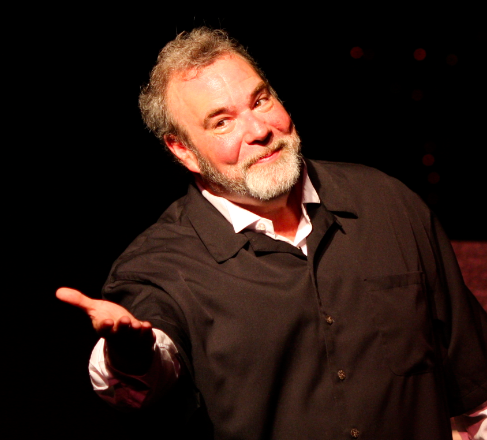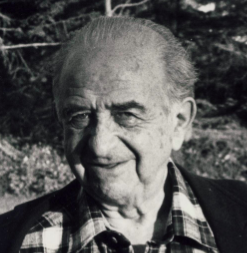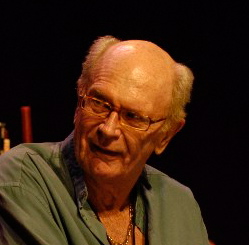 "...an intense and satisfying study of the power of conviction..."—Hats Off News
"...an intense and satisfying study of the power of conviction..."—Hats Off News
BACKSTORY...call it a duel: "Batons at 20 Paces"
"Conducting. It's not at all what you think it is. No!—it's not about waving your arm. It is a black art. To learn the magic you need a Sorcerer, and you must become that Sorcerer's Apprentice."
Acclaimed conductor, playwright and actor David Katz conjures the ghost his mentor, the legendary (and notorious) Charles Bruck, America's greatest (and most terrifyingly funny) teacher of conducting, and then battles him to the death in MUSE of FIRE, his fascinating, funny, and poignant one-man play about the secret life of conductors.
***
Great conductors are like wizards with magic wands, wielding enormous power and perfect control, seemingly at will. Silently, apparently with baton alone, they “play” the one hundred musicians of a symphony orchestra with the same ease others handle a single instrument, while the greatest of them can make the experience of listening so profound, they bring whole audiences to tears.
How do great conductors learn to make great music? What dark powers become theirs to command? The answers are to found in MUSE of FIRE, a play which lifts the veil on the conductor’s secret life, to reveal that masters of the baton are not born: they must be forged—in fire.
Based on true events
MUSE of FIRE is the story of a modern-day sorcerer and apprentice. Based on true events, it dramatizes the playwright’s experiences studying the art of conducting with Charles Bruck (1911-1995), the renowned Master Teacher of the Pierre Monteux Conducting School in Hancock, Maine, who ruled godlike over that world-renowned institution for more than twenty-five years.
 Bruck was a maestro from the “old school,” tyrannical, demonic in his fury. He intimidated students, insulted them, screamed at them, even hit them— going to any lengths to forge them in the flames of his passion for the art. Even as his rages became legendary, so, too, his acerbic wit and cutting humor, which could make his charges roar with laughter, even as they cringed. Legendary, too, was his uncompromising belief in the power and importance of music. Undeniably one of the 20th century’s greatest teachers of conducting, Charles Bruck was also one of the most feared, imitated and admired.
Bruck was a maestro from the “old school,” tyrannical, demonic in his fury. He intimidated students, insulted them, screamed at them, even hit them— going to any lengths to forge them in the flames of his passion for the art. Even as his rages became legendary, so, too, his acerbic wit and cutting humor, which could make his charges roar with laughter, even as they cringed. Legendary, too, was his uncompromising belief in the power and importance of music. Undeniably one of the 20th century’s greatest teachers of conducting, Charles Bruck was also one of the most feared, imitated and admired.
Charles Bruck is not as well known in the U.S. and Canada as some other conducting mentors, but his students certainly are. Among those who may be familiar to audiences are Hugh Wolff, former music director of the Saint Paul Chamber Orchestra and the New Jersey Symphony, Ludovic Morlot, music director of the Seattle Symphony, John Morris Russell, conductor of the Cincinnati Pops, Marc David, Enrique Diemecke, Neal Gittleman, David Hayes, Apo Hsu, Dennis Keene, Marc Minkowski, Carlos Prieto, Emmanuel Plasson, Scott Speck, Michael Stern, and of course, David Katz.
Although there is only one actor onstage, MUSE of FIRE is actually a two-character drama in which Katz shifts effortlessly from teacher to student and back again. From the moment the young apprentice first experiences the wrath of the man who would become his sorcerer, until he last visits him on his deathbed, years later, MUSE of FIRE forms several arcs: from hatred to love, failure to triumph, life to death. Along the way, Katz plays a host of other characters, including teachers, conducting students and observers, helping to complete a complex portrait of a brilliant, funny and difficult maestro at the height of his powers.
Great orchestral music
Integral to the drama of MUSE of FIRE is orchestral music by more than a dozen composers, including compositions by Wagner, Mendelssohn, Tchaikovsky, and Schumann. The Fireworks Music, with which MUSE of FIRE climaxes, weaves excerpts from eighteen orchestral compositions into a unique aural quilt.
Performance History
The premiere of MUSE of FIRE in Maine in July 2005 coincided with the tenth anniversary of the death of Maestro Bruck. First performances took place at Oceanside Meadows Theater Barn in Prospect Harbor and Acadia Repertory Theater in Bar Harbor, both very close to where many of the original events depicted in the play took place.
David Katz has since performed MUSE of FIRE not dozens but scores of times, including in an extended engagement in Chicago, in Baltimore (Conductors Guild Annual Conference), in Boston and Halifax; for the College Orchestra Directors Association convention; on tour in New York, Connecticut, Massachusetts, Maine, Michigan, New Jersey, Illiinois, Kentucky; for symphonies, theater companies, churches, schools and synagogues; and in Canada, under the auspices of the Maine Center for the Arts. In addition to touring the U.S. and Canada, an off-Broadway production is in negotiation.

MUSE of FIRE was the last play directed by Tony Award-winning actor and famed theater and opera director, Charles Nelson Reilly, who brought both The Belle of Amherst and The Gin Game to Broadway. For more about Mr. Reilly, please see BIOS.

